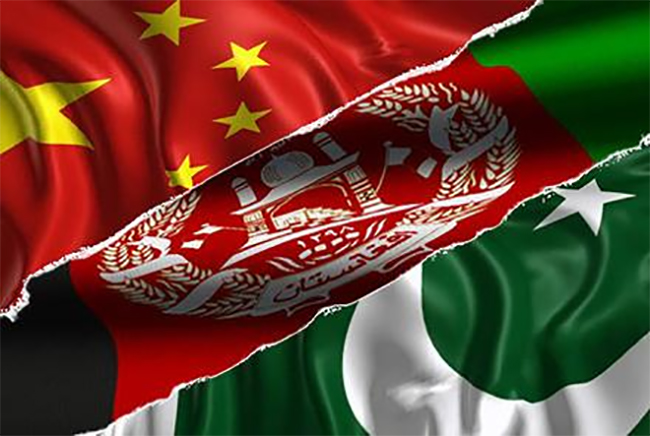The relation between Afghanistan and Pakistan has undergone many ups and downs in the post-Taliban Afghanistan which induced China to mediate between the two neighboring countries. The issue of terrorism and porous border triggered a blame game between Afghan-Pak officials and brought them to dead end. Exchanging harsh rhetoric against each other led to further frustration. Although Afghan-Pak officials exchanged trips to defrost the icy relation, there was no palpable result.
In recent years, China has sought to play a mediatory role between Kabul and Islamabad and is concerned about the security issue in Afghanistan. For instance, China is a member of the Quadrilateral Coordination Group (QCG), which comprises of Afghanistan, Pakistan, China, and the US and established in December 2015 in the Heart of Asia Conference, to broker peace talks between Kabul government and warring parties.
Similarly, Beijing hosted the first China-Afghanistan-Pakistan Foreign Ministers’ Dialogue on 26 December 2017 to strengthen mutual trust between Kabul and Islamabad, deepen cooperation based on the Five Principles of peaceful coexistence and advocate Afghan-led and Afghan-owned peace talks. This dialogue was held with the efforts of Chinese Foreign Minister Wang Yi, who made trips to Afghanistan and Pakistan to arrange the dialogue. According to Wang Yi, China, Afghanistan and Pakistan were strategic cooperation partners and shared integrated interests and people-to-people relations. He added that the 19th National Congress of the Communist Party of China (CPC) put forward to build a community with shared future for mankind and deepen relations with neighboring countries.
In his recent trip to China, Afghan National Security Advisor (NSA) Hanif Atmar met with Wang Yi and discussed the need for deepening bilateral relations. Meanwhile, the two sides stressed the need for continuation of trilateral dialogue. Atmar said that Kabul will host the next round of trilateral meeting of foreign ministers consisting of China, Afghanistan and Pakistan. He added that China could play a significant role for strengthening regional peace and stability and promoting economic cooperation.
China is believed to play a key role in bridging the gap between Kabul and Islamabad through minimizing the mistrust and putting an end to the blame game which has deteriorated the mutual relations for a long time. Initiating the foreign ministerial-level meeting has been a significant step taken by Beijing. The forthcoming trilateral meeting is hoped to strengthen Afghan-Pak relation and reinforce their determination in combating terrorism.
It is self-explanatory that terrorism has inflicted heavy casualties upon Afghan and Pakistani nations. In other words, the death toll in the two countries is outrageous. A handful of terrorist networks seek to fuel sectarian violence in Afghanistan and Pakistan. For instance, the attack on Christians in Pakistan in early April and attack on Shiites in Afghanistan in late April – the responsibility for both of which were claimed by the self-styled Islamic State of Iraq and the Levant (ISIL) – suggest two facts: First, terrorist networks intend to spark off sectarian violence in the two countries. Second, terrorists are a common enemy of the two neighboring countries. Hence, it is time for both states to stop the blame game and combat terrorism with strong determination.
China’s push for strengthening a lasting relation between the two countries is to play its role in stabilizing the region so that all nations could live a peaceful life. That is to say, a peaceful Afghanistan and Pakistan will contribute to regional stability, overcome the security challenges, and pave the ground for economic activities. A fruitful campaign against terrorism is not possible unless the two countries cultivate a friendly relation; this is what China is in pursuit of.
A number of political pundits, especially in Pakistan, believe that reconciliation process will be more fruitful than military deal. China also shows tendency in advocating peace process between Kabul government and the Taliban. In such a case, the QCG will have to play its part more seriously to nudge the Taliban to negotiating table. Chinese officials are most likely to believe that if Afghanistan and Pakistan – who are the two instrumental members of QCG – cultivate a strong tie, they will be able to push the Taliban to peace table.
To sum up, China’s concern about regional peace and stability is easily noticeable. China does not only seek to deepen its friendly relation with neighboring countries but also bridge the gap between them. If all states, including Afghanistan and Pakistan, play their part in contributing to regional peace, peace and prosperity will be just around the corner. It is hoped that the upcoming trilateral dialogue will end mistrust and build a strong trilateral tie among the three neighboring countries.
Home » Opinion » China’s Role in Bridging the Gap between Afghanistan and Pakistan
China’s Role in Bridging the Gap between Afghanistan and Pakistan
|

